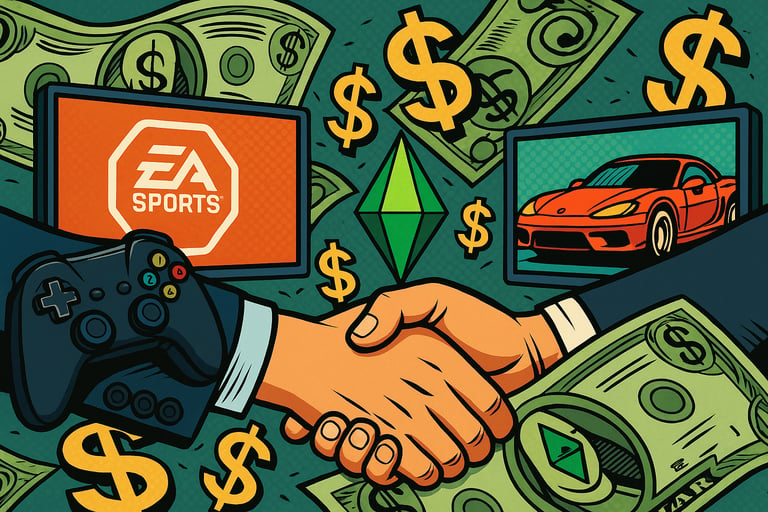EA’s $55 Billion Sale Marks Largest Leveraged Buyout in History
The gaming giant goes private in a debt-heavy deal led by Saudi Arabia’s PIF and private equity partners.
10/1/20252 min read
Electronic Arts (EA), one of the world’s most iconic video game publishers, has agreed to a record-breaking $55 billion sale that analysts are already calling the largest leveraged buyout (LBO) in history.
The consortium of buyers includes Saudi Arabia’s Public Investment Fund (PIF), private equity firm Silver Lake, and Affinity Partners, the fund led by Jared Kushner. The deal values EA at $210 per share — a 25% premium over its market price — and will take the company private, removing it from public trading after decades on the Nasdaq.
The mechanics of the deal
Of the $55 billion purchase price, roughly $36 billion will come from equity provided by the buyers, while approximately $19–20 billion will be financed with debt. This debt-financed structure — typical of leveraged buyouts — means EA’s future revenues will be heavily relied upon to service loan repayments.
With franchises like EA Sports FC, Madden, Battlefield, The Sims, and Need for Speed, EA generates billions in recurring revenue. However, industry analysts warn that the pressure to maintain cash flow under a $20 billion debt load could constrain EA’s ability to fund new IP development or experimental projects.
“Servicing the debt will likely take priority,” notes Christopher Dring, an industry expert. “That raises concerns about tighter cost controls, possible headcount reductions, and an even heavier dependence on blockbuster annual releases to generate predictable income streams.”
Why this LBO matters
The transaction is significant not only because of its scale — eclipsed only by Microsoft’s $69 billion Activision Blizzard acquisition — but also because it revives a financing structure less common in the gaming industry. Leveraged buyouts, more often seen in manufacturing or telecoms, are now reshaping digital entertainment.
Analysts point out that the $55 billion deal represents an unusual crossover of sovereign wealth and private equity capital. For Saudi Arabia’s PIF, the purchase is a continuation of its long-term strategy to diversify away from oil and build a foothold in entertainment and esports. For Silver Lake, which has a history of investing in tech and media companies, the deal underscores private equity’s growing appetite for large-scale intellectual property portfolios.
Strategic implications
CEO Andrew Wilson, who will remain in place, called the deal a “powerful recognition” of EA’s role in global entertainment, promising “transformative experiences to inspire generations.”
But beyond rhetoric, the LBO structure means EA’s cash flow will effectively become a financial engine for debt servicing. In practice, this could:
Prioritize established franchises like EA Sports FC and Madden at the expense of riskier innovation.
Drive stricter cost efficiency measures, potentially impacting headcount.
Limit short-term financial flexibility, though private ownership could also give EA freedom from quarterly Wall Street pressure.
Saudi Arabia’s expanding footprint
For Riyadh, this acquisition represents a major leap in gaming influence. PIF already controls Scopely (Monopoly Go) and Niantic’s gaming division (Pokémon Go), and has invested in Nintendo and Take-Two Interactive. Hosting the eSports World Cup and the planned 2027 Olympic eSports Games further cements its ambition to dominate the sector.
Still, the involvement of Saudi capital raises reputational questions, given the government’s human rights record and lingering fallout from the 2018 killing of journalist Jamal Khashoggi, which the UN attributed to the Saudi state.
The bottom line
The $55 billion EA transaction is more than a blockbuster gaming headline — it is a watershed moment for the use of leveraged buyouts in digital entertainment. How EA manages its new debt burden, and whether private ownership will unlock innovation or enforce austerity, will define not just the company’s future but also set a precedent for how capital markets approach the gaming sector.


Perpi Ltd
159A Portnall Road, London, W9 3BN, United Kingdom
© 2025. All rights reserved.
